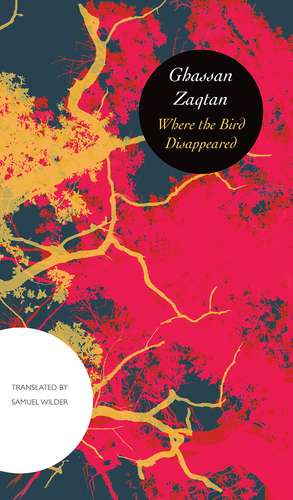Where the Bird Disappeared: The Arab List
Autor Ghassan Zaqtan Traducere de Samuel Wilderen Limba Engleză Hardback – 15 iul 2018
This lyrical novel, set in the surroundings of the Palestinian village of Zakariyya, weaves a narrative rich in sensory detail yet troubled by the porousness of memory. It tells the story of the relationship between two figures of deep mythical resonance in the region, Yahya and Zakariyya, figures who live in the present but bear the names—and many traits—of two saints. Ranging from today into back to pre-1948 Palestine, the book presents both a compelling portrait of a contemporary village and a sacred geography that lies beyond and beneath the present state of the world. Sensual, rich in allusion, yet at the same time focused on the struggles of today, Where the Bird Disappeared is a powerful novel of both connection and dispossession.
Din seria The Arab List
-
 Preț: 99.67 lei
Preț: 99.67 lei -
 Preț: 119.78 lei
Preț: 119.78 lei -
 Preț: 112.06 lei
Preț: 112.06 lei -
 Preț: 141.58 lei
Preț: 141.58 lei -
 Preț: 156.23 lei
Preț: 156.23 lei -
 Preț: 124.90 lei
Preț: 124.90 lei -
 Preț: 113.01 lei
Preț: 113.01 lei -
 Preț: 107.84 lei
Preț: 107.84 lei -
 Preț: 142.09 lei
Preț: 142.09 lei -
 Preț: 97.36 lei
Preț: 97.36 lei -
 Preț: 97.93 lei
Preț: 97.93 lei -
 Preț: 124.85 lei
Preț: 124.85 lei -
 Preț: 101.45 lei
Preț: 101.45 lei -
 Preț: 78.42 lei
Preț: 78.42 lei -
 Preț: 89.72 lei
Preț: 89.72 lei -
 Preț: 154.74 lei
Preț: 154.74 lei - 15%
 Preț: 137.89 lei
Preț: 137.89 lei - 17%
 Preț: 123.62 lei
Preț: 123.62 lei - 21%
 Preț: 103.71 lei
Preț: 103.71 lei - 14%
 Preț: 114.56 lei
Preț: 114.56 lei -
 Preț: 133.76 lei
Preț: 133.76 lei - 17%
 Preț: 103.39 lei
Preț: 103.39 lei - 16%
 Preț: 123.97 lei
Preț: 123.97 lei
Preț: 82.75 lei
Preț vechi: 100.92 lei
-18% Nou
Puncte Express: 124
Preț estimativ în valută:
15.83€ • 16.53$ • 13.10£
15.83€ • 16.53$ • 13.10£
Carte indisponibilă temporar
Doresc să fiu notificat când acest titlu va fi disponibil:
Se trimite...
Preluare comenzi: 021 569.72.76
Specificații
ISBN-13: 9780857425423
ISBN-10: 0857425420
Pagini: 96
Dimensiuni: 127 x 203 x 18 mm
Greutate: 0.23 kg
Ediția:1
Editura: Seagull Books
Colecția Seagull Books
Seria The Arab List
ISBN-10: 0857425420
Pagini: 96
Dimensiuni: 127 x 203 x 18 mm
Greutate: 0.23 kg
Ediția:1
Editura: Seagull Books
Colecția Seagull Books
Seria The Arab List
Notă biografică
Born near Bethlehem, Palestinian poet, novelist, and editor Ghassan Zaqtan has lived in Jordan, Syria, Lebanon and Tunisia. He is the author of numerous collections of poetry, a novel, and a play. Samuel Wilder is a translator of Arabic literature, a writer, and a student of comparative poetics. Since 2006, he has lived and worked as a literary translator in Cairo and Beirut, and pursued academic work in London and Cambridge.
Recenzii
"Zaqtan’s narrative is lyrical, heartbreaking and profound. Rooted in Palestine—a land that stood the test of time and would go on to become the hub of early and modern civilizations—the story is captivating enough to transport us to the hideaway monastery in Nuba Karam or the vineyards of Beit Jalla, the new homes for several villagers forced into exile."
“Zaqtan is certainly a master of his art, one who is able to be a mythmaker and a witness at the same time, which is rare among poets. . . . A word-artist of the first order.”
